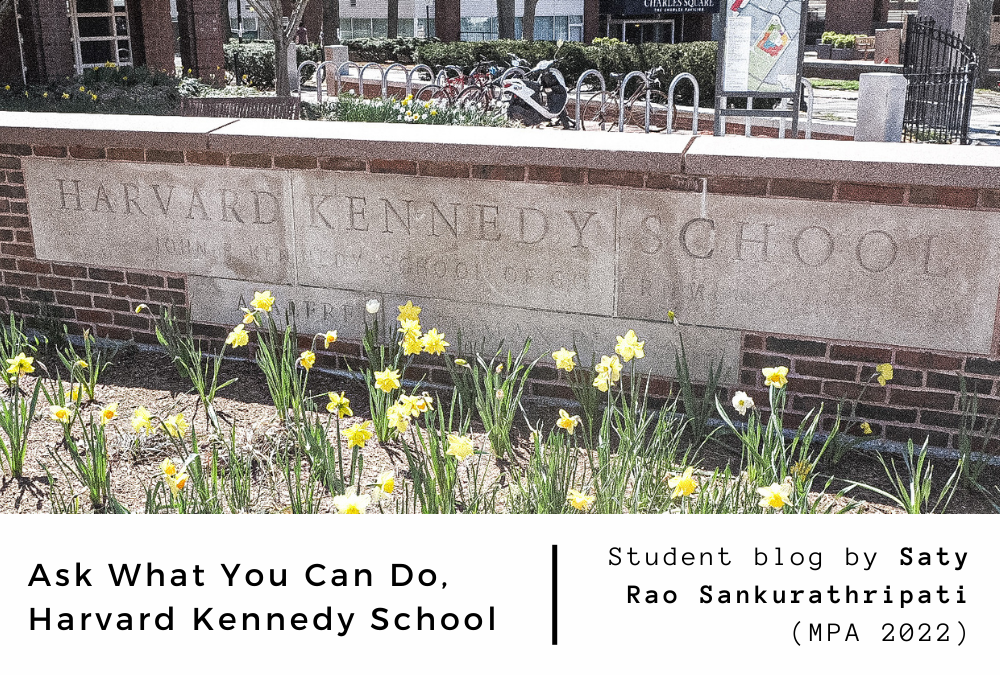“Specialists without spirit, sensualists without heart”. Writing about bureaucracy in 1904, little did German sociologist Max Weber know that his description could extend to the Harvard Kennedy School (HKS) in 2022. Next month, hundreds of students will don regalia for their HKS graduations. They will leave Cambridge having been insufficiently prepared by HKS to be more than the technocrats Weber described in today’s complicated political and civic context.
HKS’s mission is to “improve public policy and leadership so people can live in societies that are more safe, free, just, and sustainably prosperous”. The U.S. is struggling across each of HKS’s societal end-objectives: violent crime is surging, democratic standards have eroded, rule of law has declined amid a pandemic, and productivity growth continues to slow down. Reversing these trends requires that government leaders demonstrate ingenuity and the ability to convince those who think differently, and renew faith in government. The U.S. is increasingly lacking leaders with these capacities, and HKS can do more to build these capacities in its students.
Ingenuity. The U.S. is in a creativity crisis. As digital distraction has grown in prevalence, our collective ability to imagine has weakened. With the wage gap between public and private sector employees growing in the U.S., it is safe to say that the inventors amongst us have an incentive to go private. HKS is doing little to buck the trend. The Master in Public Policy (MPP) core curriculum includes courses in Economics, Negotiations, Ethics, and other fields. Students in this or one of HKS’s other degree programs could graduate without reading Rousseau, Marx, or Rawls or grappling with the fundamental question of political thought: what could a truly ‘good’ society look like? More practically, HKS does not offer courses in design thinking, a tried-and-tested approach to solving human problems creatively. Creativity is also in crisis at HKS.
Ability to Convince. Society’s collective conviction in reasoned argument is in decline. Informed public debate has broken down in the wake of endemic polarization. One would expect political debate to be lively at HKS; one who expects this would be wrong. HKS does not have a debate society where students could make reasoned arguments on political issues and engage with others’ arguments. While debates among students and with faculty do occur over cafeteria coffees, those conversations are not extended to the broader HKS community. Speakers at the HKS-housed Institute of Politics – including Democratic Congressmen Jamie Raskin and Ro Khanna and Republican Senator Tim Scott in the last few weeks – are typically engaged in Q&A formats when they could instead debate each other. Neither HKS students nor visitors are given platforms to make their case, against another case, to the student body. Like the U.S., HKS has lost faith in dialectic, the process of seeking truth and justice through reasoned debate.
Faith in Government. Public trust in government is near historical lows and has trended downward for two decades. This decline in trust is reflected in the post-graduation career paths of HKS students. Students increasingly are electing to pursue private sector careers. In 2011, 34% of graduating HKS students took private sector jobs. In 2021, 43% did. This trend is acute with Master of Public Administration (MPA) students, who often also have business degrees. In 2011, less than 6 out of every 10 MPA graduates took private sector jobs while in 2021 9 of 10 did. Based on students’ career choices, either HKS is admitting students who already lack faith in government, or students are losing faith while at HKS. Perhaps it also has something to do with HKS’s mounting tuition costs and primarily merit-based – not need-based – financial assistance programs.
Some may argue that, as a professional school, HKS ought to focus on providing high-quality technical education in policy, in domains ranging from cybersecurity to climate. But, such a focus would represent a failure in HKS’s pursuit of its mission. Our times call for more than number crunching, memo-writing human encyclopaedias. HKS should aspire to meet the needs of our times by developing leaders who are creative, able to convince, and actually believe in government.
So, what should we ask the HKS administration to do? For starters, it should offer courses in areas such as political theory and design thinking that broaden students’ conceptions of what they can strive towards and do. It should develop platforms for student, faculty, and public debate. It should admit and financially support students willing to invest their faith in government with their careers. More fundamentally, HKS should re-evaluate how it can holistically advance its mission, through curriculum, student life, admissions, and career development, in a rapidly changing world.
